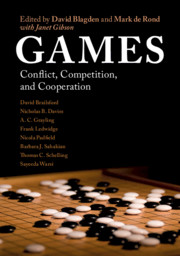Book contents
- Games
- The Darwin College Lectures
- Games
- Copyright page
- Dedication
- Contents
- Figures
- Notes on Contributors
- Acknowledgements
- Introduction Games: The Spectrum of Conflict, Competition, and Cooperation
- 1 Personal Principles in the Political Game
- 2 The Game of Crime and Punishment
- 3 Wittgenstein's Games
- 4 Games in Sports
- 5 Losing the ‘New Great Game’
- 6 Games for the Brain
- 7 Games Animals Play
- Afterword The Game Theory of Conflict
- Index
2 - The Game of Crime and Punishment
Published online by Cambridge University Press: 26 October 2018
- Games
- The Darwin College Lectures
- Games
- Copyright page
- Dedication
- Contents
- Figures
- Notes on Contributors
- Acknowledgements
- Introduction Games: The Spectrum of Conflict, Competition, and Cooperation
- 1 Personal Principles in the Political Game
- 2 The Game of Crime and Punishment
- 3 Wittgenstein's Games
- 4 Games in Sports
- 5 Losing the ‘New Great Game’
- 6 Games for the Brain
- 7 Games Animals Play
- Afterword The Game Theory of Conflict
- Index
Summary
The criminal justice process has often been compared to a ‘game’: the ‘games’ lawyers play, for example, or the various ‘games’ played by prisoners or prison psychologists. It is always other people who are playing games ... This chapter will explore current trial processes and sentencing processes in England and Wales by comparing them with traditional games: in what sense is a trial like a game of ‘Blind Man’s Buff’? Why does progressing through the prison system feel for many prisoners like a game of ‘Snakes and Ladders’? Of course, none of these processes really feels like a game to the principal players. But the analogies can throw fresh light on how we should evaluate the effectiveness of our criminal justice system.
- Type
- Chapter
- Information
- GamesConflict, Competition, and Cooperation, pp. 25 - 40Publisher: Cambridge University PressPrint publication year: 2018

